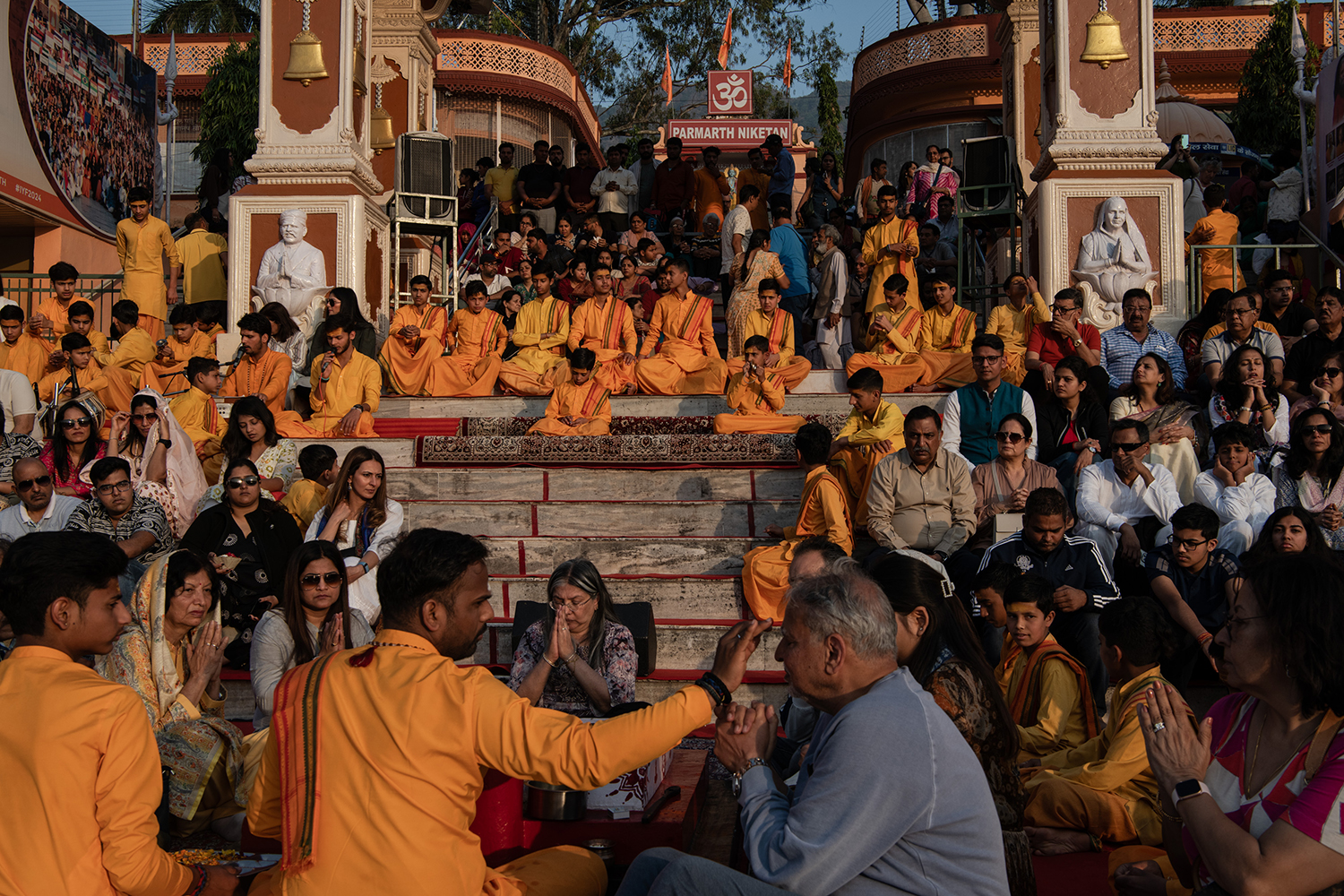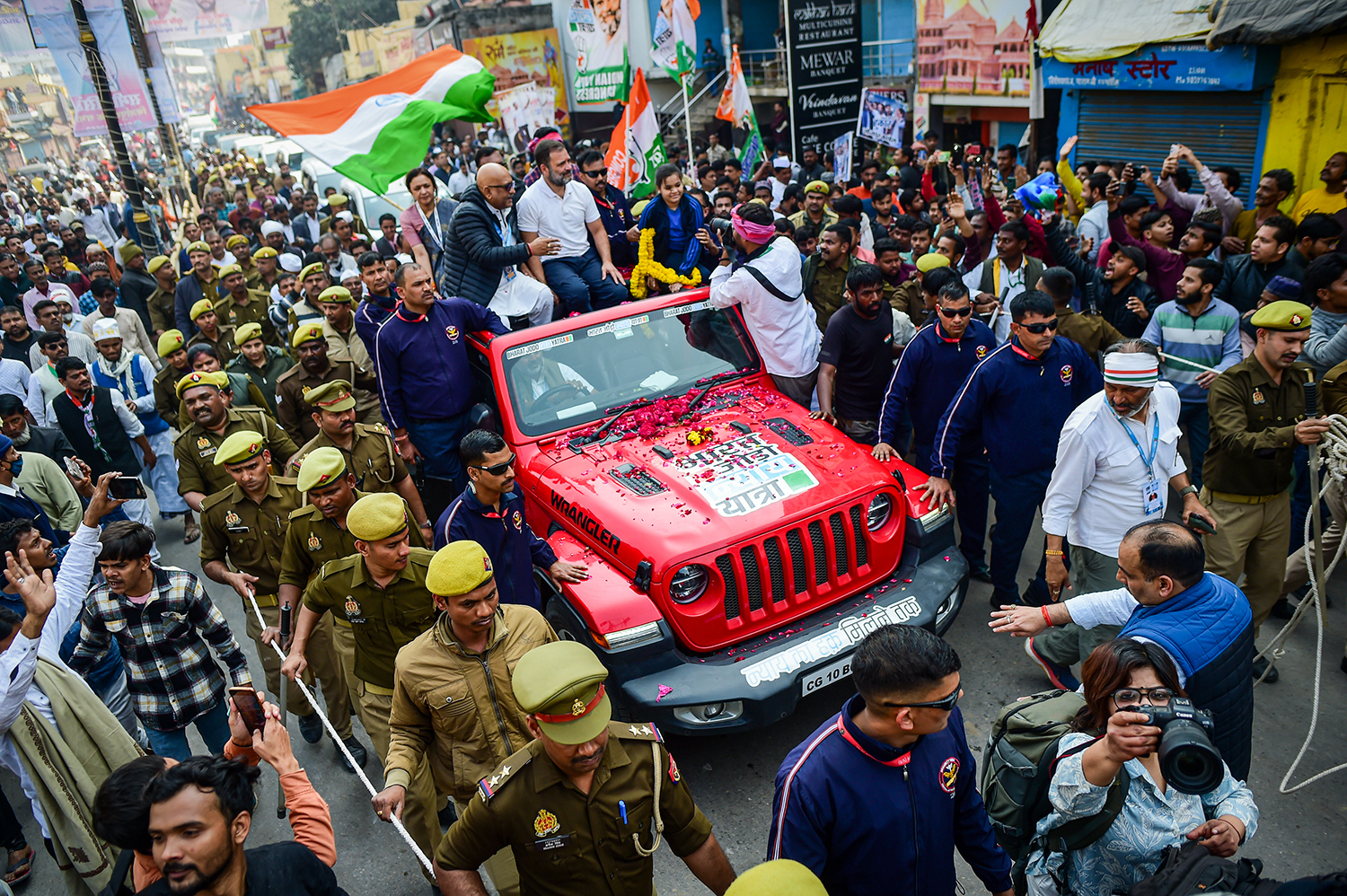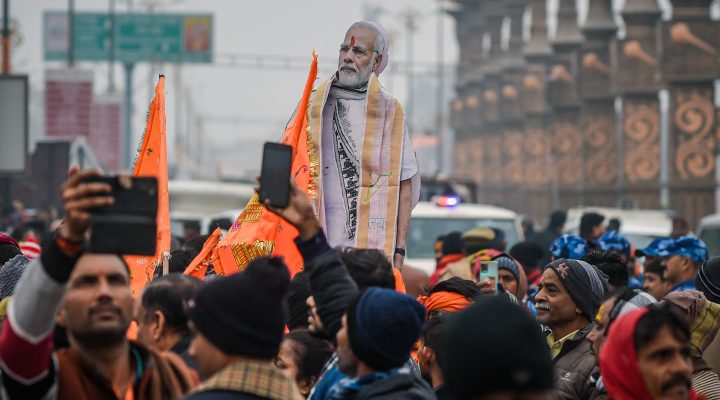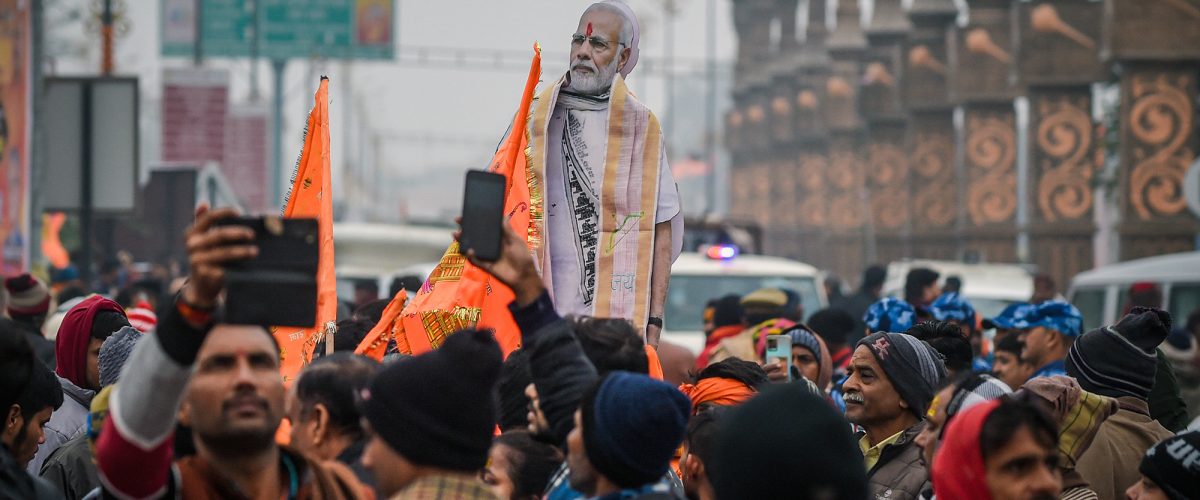The world’s largest exercise in democracy begins April 19 in India — an enterprise so vast as to boggle the mind.
Encompassing a million separate polling stations, employing 15 million election workers, spread over six weeks, the national parliamentary elections will decide who governs 1.4 billion people for the next five years.
Indian national elections — by turns inspiring and rowdy — are a colorful pageant, and they used to keep Indians in suspense until the final results were announced. Now they’re essentially a foregone conclusion. Prime Minister Narendra Modi and his Bharatiya Janata Party, in power since 2014, likely will win reelection and continue their relentless march toward Hindu nationalist rule over the subcontinent.
That may please many Indian Hindus, who comprise about 80% of the population. But India also is home to 200 million Muslims (the third-largest Muslim population in the world), 28 million Christians, 21 million Sikhs, 8.5 million Buddhists, 4.5 million Jains and a wide variety of tribal faiths.
Must they, too, submit to Hindu edicts? Yes, according to Hindutva, the century-old extremist political philosophy behind Hindu nationalism. It regards Hindus as the only “true Indians” — destined to reclaim their rightful place in power from invading Muslims, who have been on the subcontinent for more than 1,000 years, and any other perceived intruders.

Indian Hindu priests, monks, and devotees chant prayers and gather ahead of the nightly arti prayer ceremony at the Parmath Niketan ashram on the River Ganges on March 16, 2024, in Rishikesh, India. The ruling Bharatiya Janata Party (BJP) places significant political importance on North Indian pilgrimage towns like Varanasi, Rishikesh and Haridwar due to their cultural and religious significance in the Hindu religion. These towns serve as symbolic hubs of Hindu identity and pilgrimage, enabling the BJP to tap into religious fervor and historical narratives to strengthen its political base and influence. The states are expected to favour the BJP during the upcoming general elections in India — the world’s largest voting exercise — which will take place in stages over a span of about six weeks starting in April. (Photo by Rebecca Conway/Getty Images)
India’s founding vision at risk
Christian nationalism may pose a significant threat to democracy and religious freedom in America. But it’s an upstart compared to Hindu nationalism, which is attempting to stamp out, once and for all, the dream of tolerant, secular democracy envisioned by modern India’s founders, Mohandas K. Gandhi and Jawaharlal Nehru.
Article 25 of the Indian Constitution, adopted in 1949, guarantees “freedom of conscience and the right freely to profess, practice and propagate religion.” Gandhi and Nehru hoped that ideal, combined with rigorously secular democracy, would deliver India from the rivers of blood shed over centuries of ethnic and religious hatred, particularly between Hindus and Muslims.
Manipulation of those hatreds during British colonial rule made ancient enmities worse, culminating in the upheaval of Partition after India gained independence. Up to 2 million people died as Muslim Pakistan was born amid bloody communal violence and forced relocations on both sides.
To escape an endless cycle of ethnic-religious conflict, “India’s Constitution and founding documents unambiguously declare the country a secular nation of all its citizens,” writes Zack Beauchamp in Vox. “This universalistic vision permeates Indian law and government; it lies at the heart of the Indian state. India’s founders believed this was essential to making the Indian state a viable democracy: There is no world in which the citizens of such a large and staggeringly diverse country could cooperate together if they weren’t guaranteed certain basic equal rights.”
“Hindu nationalists rejected that vision from the beginning.”
Nehru, India’s first prime minister, put it this way in 1948: “We must have it clearly in our minds and in the mind of the country that the alliance of religion and politics in the shape of communalism is a most dangerous alliance. The only right way for us to act is to do away with communalism in its political aspect in every shape and form.”
Hindu nationalists rejected that vision from the beginning — including Nathuram Godse, the extremist who assassinated Gandhi in 1948. Godse was a former member of the violently extremist Rashtriya Swayamsevak Sangh, which is closely aligned with the ruling BJP. Modi, the current prime minister, joined the once-banned RSS when he was a youth.
The nationalists vilified the moderate founders — and the idea of secular democracy — as a surrender to Western colonial influence and a betrayal of India’s true (Hindu) heritage. They wandered in the political wilderness for the first 30 years of modern India’s existence. But they have steadily gained influence in recent decades as the long-dominant Congress Party, led by Nehru, Indira Gandhi and her son, Rajiv, fell into complacency and scandal.
Modi became prime minister in 2014, despite his radical reputation and charges he ignored — and maybe abetted — the massacre of several thousand Muslims in 2002, when he was chief minister of Gujarat state. He campaigned on economic issues but has pushed an increasingly aggressive Hindu agenda since taking office.
Nationalism triumphant
Leading up to this year’s elections, the signs of Hindutva’s advancing triumph are inescapable:
- A law recently adopted in Uttarakhand state, the Uniform Civil Code, requires all residents to follow the same rules for marriage, divorce, adoption and inheritance. Muslims and other non-Hindus protest that the code disregards their own longstanding customs. Similar laws are expected to be introduced in other India states, and possible at the federal level.
- Just weeks before the upcoming elections (and on the eve of the Muslim observance of Ramadan), the government abruptly announced it would implement the controversial Citizenship Amendment Act, which expedites citizenship for refugees and asylum seekers from nearby countries — unless they are Muslim. It’s been linked to the equally controversial National Register of Citizens, which could lead to the deportation of millions of (mostly Muslim) people who have lived in India for generations but lack formal citizenship. “The CAA is unconstitutional and discriminatory on several grounds, including exclusion based on religion,” charged Prashant Bhushan, a senior Supreme Court lawyer. “The timing of the notification is meant to polarize the electorate upon the Hindu-Muslim divide.”
- The Modi regime has harassed, intimidated, sued and audited the once-diverse and lively Indian press into submission — or silence. The Indian judiciary and other government organs also have been cowed by threats and pressure. Congress Party leader Rahul Gandhi was prosecuted on trumped-up charges. BJP politicians, meanwhile, have ignored, excused and sometimes encouraged taunting and violent attacks by Hindu mobs against Muslims, Christians and other minority communities.
- Ever-popular Bollywood, which once united Indians of all backgrounds, has produced no fewer than a dozen pro-government films in the leadup to the elections. Some of them promote Islamophobic narratives and conspiracy theories, according to critics. The films are “brazen propaganda which are deliberately creating wounds and fault lines to serve the government’s political agenda,” said Sayandeb Chowdhury, a literature professor and cinema specialist at Krea University in Chennai, in an interview with The Guardian. “If cinema itself becomes a tool of division, one of India’s more cherished unifying symbols is in danger of being lost forever.”

India’s Congress Party leader Rahul Gandhi (sitting atop Jeep vehicle, wearing white) takes part in a roadshow as part of his ‘Bharat Jodo Nyay Yatra’ (India Come Together Anew Tour) on February 17, 2024, in Varanasi, India. India’s Congress party, of which Gandhi is the leader, said that its bank accounts had been frozen over a 2.1 billion rupee income tax dispute. The party said the action was an assault on democracy, with Indian elections scheduled to start shortly, a contest widely expected to be convincingly won by Prime Minister Narendra Modi’s Bharatiya Janata Party (BJP). (Photo by Ritesh Shukla/Getty Images)
The Ayodhya abomination
Most ominous of all, in January Modi and his nationalist allies fulfilled a decades-long campaign to build a vast temple complex in the sacred city of Ayodhya in honor of the Hindu god Ram — atop the site of a nearly 500-year-old Muslim mosque destroyed by Hindu extremists in 1992.
The elaborate temple consecration Jan. 22 was deliberately timed to challenge not only Muslims but the very idea of modern India: It essentially hijacked the national celebration Jan. 26 of Republic Day, India’s commemoration of the adoption of its Constitution after independence.
The Ayodhya mosque long served as a flashpoint for Hindu-Muslim tensions. Hindu extremists claimed it was built by Muslim Mughal invaders on the site of an earlier Hindu temple, purportedly the birthplace of Rama, one of Hinduism’s chief deities. The RSS and BJP organized increasingly violent “pilgrimages” to Ayodhya.
When a Hindu mob finally destroyed the mosque, thousands of Indians died in sectarian violence around the country. In 2019, after Modi’s first reelection as prime minister, India’s Supreme Court ruled construction of the Ram temple on the site of the destroyed mosque could begin.
Modi’s personal role in the Ram temple’s rise is particularly repulsive. He channeled huge sums of government money into the $250 million, 70-acre project, not to mention a $3 billion facelift for the entire city. The temple wasn’t complete when the glittering consecration ceremony was held — it won’t be finished until next year — but he clearly wanted the event to go ahead before the elections next month.
Modi went through 11 days of ritual purification before the ceremony, receiving exhaustive media coverage as he fed cows at his residence, visited temples and bestowed his blessing (and government funds) on new public projects. At the consecration, he appeared before 8,000 invited political leaders, business tycoons and Bollywood stars, soaking in their applause.
He called himself “an instrument” of Lord Ram.
“Today, our Ram has come,” Modi declared. “After centuries of patience and sacrifice, our Lord Ram has come. It is the beginning of a new era.”
He called himself “an instrument” of Lord Ram, CNN reported, divinely anointed to “represent all the people of India.”
Delirious celebrations followed in cities and villages across India. “Jai Shri Ram” — “Victory to Lord Ram” — resounded everywhere. And alongside the joyful displays came frightening demonstrations of Hindu extremism.
Journalist Rana Ayyub described a typical scene in The Washington Post: “In Mira Road, a neighborhood with a sizable Muslim population in Mumbai, mobs carrying saffron flags, sticks and swords went on a rampage after the temple dedication, attacking shopkeepers, residents and drivers, chanting ‘Jai Shri Ram.’ Muslim shops were ransacked. Shops and vehicles with saffron flags were spared. Many of the Muslim families had relocated to the area after the 1992 riots, but now it seemed that the mob was back. On WhatsApp, fearful Muslim families shared a video of a young Muslim woman in an abaya forced to chant ‘Jai Shri Ram’ by a mob.”
Indian Christians have endured the same sort of abuse and intimidation in many areas.
Does Modi really believe his quasi-divine act, or is he cynically using it to implement the hardline Hindu nationalism he has espoused since his early days? I’m not a mind reader. Either way, he has nearly completed his long-term goal of destroying the democratic ideals of modern India.
“This is a purely political spectacle, the culmination of a 40-year political project — one that has been achieved through great violence,” laments writer Kapil Komireddi. “It is the coronation of Hinduism as India’s state religion and the crowning moment for the cult of personality erected around Modi. I see this as a very sad moment for India.”
Food for thought, to say the least, for Americans watching the evolution of a similar movement attacking our own secular democracy.
Erich Bridges, a Baptist journalist for more than 40 years, has covered international stories and trends in many countries. He lives in Richmond, Va.
Related article:
India at 75: The world’s largest democracy is dying of toxic nationalism


